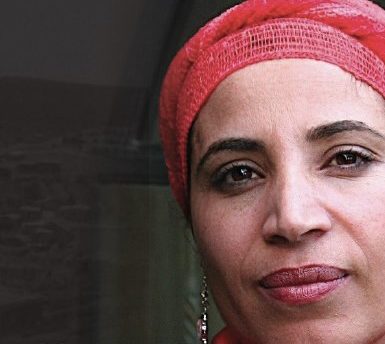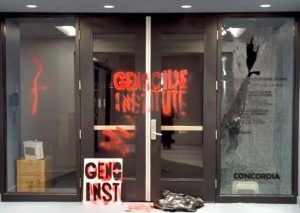A trailblazer in Arab-Jewish relations and Bedouin rights activist views the current situation in Israel “the worst” in her lifetime—both for minorities and the country as a whole.
Amal Elsana Alh’jooj, founder of the non-governmental Arab-Jewish Centre for Equality, Economic Empowerment and Cooperation, said she no longer has much hope for a two-state solution.
Ahl’jooj, 50, who grew up in a poor family in the Negev and lives in Montreal, was among the first Israeli and Jordanian students to participate in the McGill Middle East Peace Program (MMEP), a special master’s social work program designed to train them to organize their communities’ most disadvantaged people, while fostering intercultural dialogue.
Later expanded to include Palestinians and Syrians, the program evolved into the International Community Action Network, still based at McGill University. Ahl’jooj has been the executive director since 2015.
She was speaking at the local launch of her memoir Hope is a Woman’s Name (Haldan Publishers), held at the Atwater Library, which covers her remarkable rise from an unwanted daughter in an oppressive patriarchal society to pioneering feminist and charismatic human rights advocate, eventually earning a PhD at McGill and post-doctorate at the Harvard Kennedy School of Public Policy.
‘’I am a proud Palestinian and citizen of Israel, but not proud of what is happening now. I worked for more than 20 years (for Arab-Jewish understanding); this is the worst I have seen and no one expected this situation, but it is not surprising under the Netanyahu regime,” she said.
Asked to elaborate, Ahl’jooj described the new government as “fascist,’’ voicing her specific concern over far-right National Security Minister Itamar Ben-Gvir and Finance Minister Bezalel Smotrich.
She fears Israel will become even more of an “ethnocratic state,” but is heartened by the massive demonstrations by Israelis against the government.
At the same time, she criticized longtime Palestinian President Mahmoud Abbas for having lost the trust of his people because he has not delivered a better life, even though he kept all of his agreements with Israel.
“Peace comes when partners sit together and talk, but Israel never viewed Abbas as a partner, but as a servant. He has lost legitimacy in the eyes of his own people,” she said.
Although an optimist by nature, Ahl’jooj said she sees no new negotiations. She still believes in the power of people—Palestinians and Israelis—to succeed where their leaders fail.
“This is where civil society can play a crucial role, by leading from the bottom,” she said, an ideal instilled in her by the McGill program which aimed to empower marginalized citizens.
“Israel has never been a democracy for us (Arab citizens); by law, we are second-class citizens, contrary to the Declaration of Independence under which everyone is to be equal,” she said.
The protection of minorities will be in jeopardy if the Supreme Court’s independence is diminished, she said, referring to the controversial proposed judicial overhaul.
“When I speak to my North American Jewish colleagues, I say stand up, use your influence of many years… Defend (Israel) from destroying itself,” she said.
A longtime proponent of a Palestinian and an Israeli state side-by-side, Ahl’jooj is “not sure it is doable,” especially with the expansion of Jewish settlements. She thinks either all West Bank settlements would have to be removed, or all settlers become Palestinian citizens to make two states possible.
She recognizes that Jewish Israelis would not accept a single bi-national state.
As for her Bedouin community, Ahl’jooj said they fear Ben-Gvir’s rhetoric that they are occupying too much of the Negev.
“There are 300,000 Bedouins in the Negev—30 percent of the population—but they are on only 3.2 percent of the land,” said Ahl’jooj. About 82,000 still live in villages that are not recognized by the government, which has tried for more than 20 years to settle the Bedouins in designated townships.
Hope is a Woman’s Name, which runs close to 500 pages, recounts the author’s life up to the time she permanently settled in Canada in 2012. Amal means hope in Arabic, she explained, the name her father chose because she was the unwelcome fifth daughter.
Her father, an agricultural worker in Israel, promised his wife he would not take a second wife, if she finally produced a son. Five boys would indeed follow.
Ahl’jooj, the first among her siblings to be born in Soroka Hospital rather than the family tent, was one of only two Bedouin women at Ben-Gurion University, when she entered in 1993.
Defying her parents and tribe, Ahl’jooj, who went to work as a shepherd as a young child, showed independence and courage from an early age.
“I was angry at a state that oppressed me and at the head of the tribe that oppressed me.”
At 14 she began teaching the village women how to read and write—reinforcing her reputation as a “troublemaker.”
McGill social work professor and MMEP founder Jim Torczyner was instrumental in persuading her father to let her continue her education abroad—no easy task.
In Montreal Ahl’jooj came to know and respect Jews in a way she never had in Israel. Her first mentor was the late Sheila Goldbloom, a social work professor who became a close friend.
Back in Israel, Ahl’jooj, who is fluent in Hebrew, devoted herself to building bridges between Palestinians and Jews, especially women, believing they could be more effective in “healing the trauma” both sides felt.
She still considers herself a committed feminist, and asks Westerners to understand that each woman defines feminism according to their culture.
She wears the Muslim headscarf, but stressed that this is her choice and not forced or a religious statement, but rather an expression of her identity, as she believes is the case for most Muslim women in Quebec. Women who are made to cover their hair, she says should stand up against such coercion.
Quebec’s secularism law, Bill 21, she says, has had the effect of dividing people, rather than fostering acceptance of others.
Immediately after the Montreal launch, Ahl’jooj was headed to London where, among other appearances, she was to talk about her memoir at a Jewish literary event.
She was then going to Morocco to speak to a Jewish group and make plans for an Arabic translation.
The Israeli newspaper Ha’aretz has given the book an “amazing” review, she said, and she expects some pushback from the Arab world. “But I am safe here (in Montreal).”







